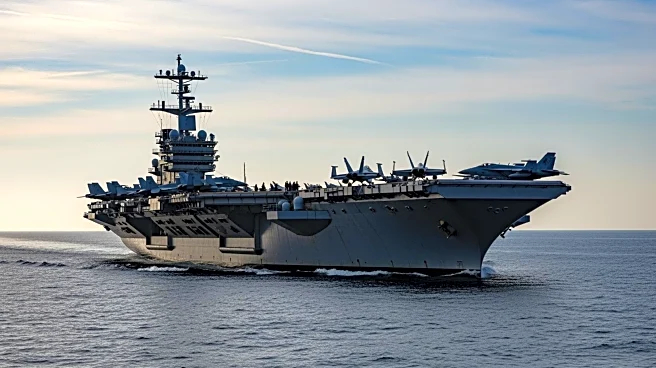What's Happening?
China has launched its most advanced aircraft carrier, the Fujian, into service, marking a significant milestone for the world's largest navy. The Fujian, China's third carrier and the first to be designed
and built domestically, features an electromagnetic catapult system that allows for the launch of aircraft with heavier payloads. The commissioning ceremony was presided over by Chinese leader Xi Jinping and attended by over 2,000 naval officers. This development is part of China's broader strategy to modernize its military and challenge U.S. dominance in the Pacific. The Fujian's capabilities are expected to play a crucial role in potential conflicts, particularly concerning Taiwan.
Why It's Important?
The entry of the Fujian into service represents a major advancement in China's naval capabilities, potentially altering the strategic balance in the Pacific. The carrier's advanced technology enhances China's ability to project power and conduct operations far from its shores, challenging the U.S. Navy's longstanding dominance in the region. This development is likely to heighten tensions between China and its neighbors, as well as with the United States, as it underscores China's growing military ambitions. The Fujian's capabilities could also impact regional security dynamics, prompting neighboring countries to reassess their defense strategies.
What's Next?
China's naval expansion is expected to continue, with further advancements in carrier technology and potential developments in nuclear propulsion. The Fujian's commissioning may lead to increased military activity in the Pacific, prompting strategic responses from the U.S. and its allies. Regional powers, particularly Japan and South Korea, are likely to monitor China's military developments closely and may enhance their own defense capabilities in response. The U.S. may also increase its naval presence in the region to counterbalance China's growing influence.
Beyond the Headlines
The expansion of China's naval capabilities raises questions about the long-term implications for global maritime security and the potential for increased tensions in the Indo-Pacific. The development of advanced carriers like the Fujian could lead to an arms race in the region, with countries seeking to bolster their own military capabilities. Additionally, China's naval ambitions may influence its foreign policy, particularly in relation to Taiwan and disputed territories in the South China Sea. The strategic use of carriers could also impact global trade routes and economic stability, as control of key maritime chokepoints becomes increasingly contested.











